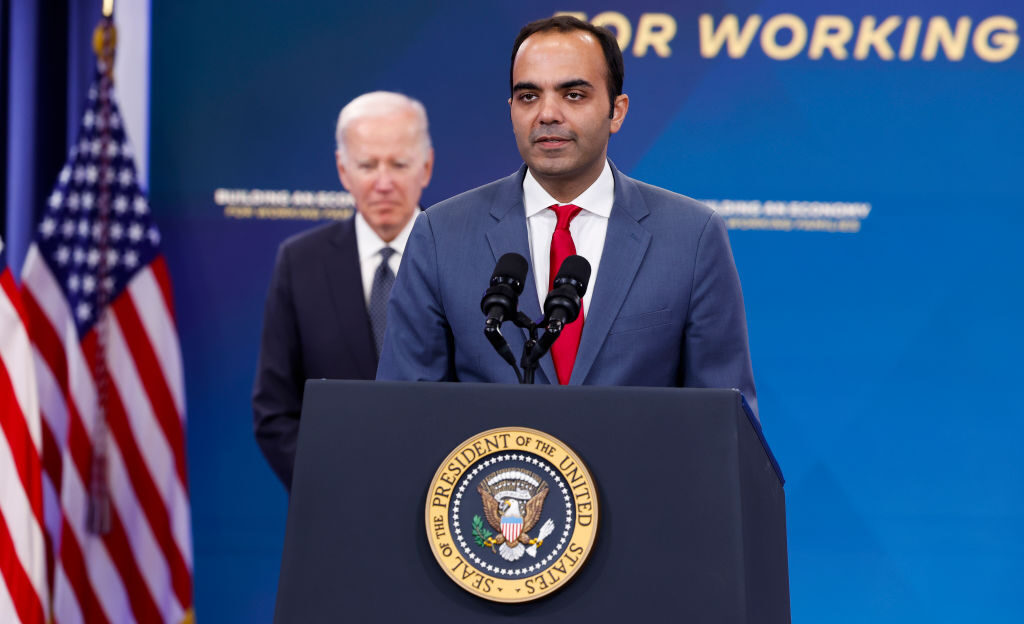The debanking phenomenon has been growing in recent years. From anti-vaccine truckers in Canada to Dutch farmers to Nigel Farage in Britain, people who say controversial things risk losing access to financial services.
In America, however, banks and tech firms might have a harder time carrying out this sort of private censorship — thanks to Team Biden. This week, the Consumer Financial Protection Bureau proposed regulations that would bar firms “fining, suing, or deplatforming based on customer comments, reviews, or political or religious views” using contracts or terms of service.
The move is sure to enrage Silicon Valley barons who already loathe the CFPB (even as some of them have faced debanking). But the proposal should garner across-the-aisle support from Trumpian populists who were hit hardest by Big Tech censorship and debanking since 2021. As CFPB Director Rohit Chopra told me in an interview on Monday, “just because someone disagrees with corporate executives, that’s no grounds for losing their fundamental rights.”
Chopra, as I wrote last year, was one of the most serious populist reformers in the outgoing administration, along with antitrust tsars Lina Khan and Jonathan Kanter and US trade representative Katherine Tai. He has watched with alarm as large firms have established what amounts to a vast, privatised regulatory system that could dramatically abridge Americans’ constitutional rights — with no means for ordinary people to push back, precisely because the system is privately controlled. When firms update their terms of service, “they slip in rules that would essentially delete federal and state laws,” Chopra said. “But when Congress or state legislatures pass laws, it doesn’t make sense for big companies to veto it.”
Take, for instance, PayPal’s warning to customers in 2022 that it would fine them up to $2,500 or close their accounts for promoting “misinformation”. When Chopra first got wind of PayPal’s proposed debanking rule, he forcefully denounced it and vowed to investigate before the company backed down. In November, his agency finalised a rule that specifically barred payment processors from debanking customers. And the CFPB is involved in ongoing litigation against the Chamber of Commerce and big banks which insist on a right to debank.
The new proposed rule, however, is Chopra’s most systematic attempt at tackling the problem. And it is sure to face intense opposition from the tech barons, even as they boast of their love of free speech. Most recently, Meta CEO Mark Zuckerberg took to Joe Rogan’s podcast to complain about CFPB oversight: “We had organisations looking into us that weren’t even involved in social media. We had the CFPB looking after us. I didn’t even know what that is. It’s some financial institution that Elizabeth Warren set up. We’re not a bank; what does Meta have to do with this?”
This is patently false. Over the last few years, Big Tech companies have been expanding their reach into the financial system by using or selling vast droves of data to shape the ads we see, which risks, Chopra noted, “creeping into a Chinese system”, involving the surveillance of our financial behavior to influence dynamic, algorithmic pricing.
The key question is whether the incoming Trump administration will follow Chopra’s path. The answer will turn on which of the Trumpian factions receives the upper hand: the techno-libertarian one led by Elon Musk, or populists who’ve recently found their most vocal anti-Big Tech champion in Steve Bannon. One thing’s for certain: working-class Trump voters, who are especially vulnerable to privatised surveillance and censorship, deserve a successor to Chopra who upholds his vision.











Join the discussion
Join like minded readers that support our journalism by becoming a paid subscriber
To join the discussion in the comments, become a paid subscriber.
Join like minded readers that support our journalism, read unlimited articles and enjoy other subscriber-only benefits.
Subscribe